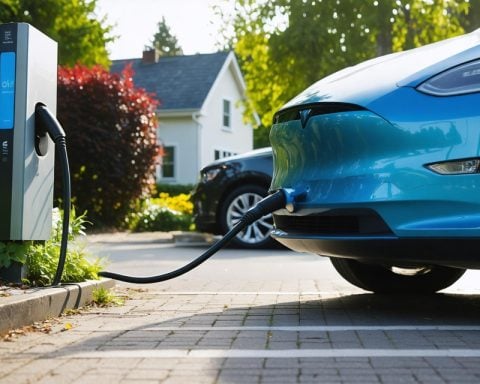In a major transformation, Nissan plans to upgrade its Canton facility into a Nissan Intelligent Factory by 2028. This move raises questions for the future of jobs in Madison County, particularly with the production of electric vehicles slated for 2025 facing delays.
Nissan recently allocated $500 million for the Canton Assembly Plant to create a dedicated line for electric vehicles. The company emphasizes its commitment to advancing mobility through this transformation. The factory aims to produce the next generation of electric vehicles, starting in 2028, while ensuring that current employees receive necessary training and skills upgrades.
Despite concerns about job security, Nissan leadership has assured that no job losses are anticipated due to this transition. However, advancements in automation have led to factories like those in Japan operating with minimal human oversight, utilizing robots for tasks ranging from welding to quality inspection.
Recent reports suggest a reduction in overall vehicle production for 2025, with 100,000 fewer vehicles expected from the Mississippi and Tennessee plants. Models affected include popular lines such as the Frontier and Rogue.
Additionally, Nissan’s potential merger with Honda by 2026 signifies significant industry shifts that could impact local economies. Experts express cautious optimism, noting that while challenges exist, effective plans are typically put in place to navigate such transitions in the automotive sector. The coming years will be critical for both Nissan and the broader community as they adapt to these changes.
Future Implications of Nissan’s Transformation
As Nissan endeavors to establish its Canton facility as a leading Nissan Intelligent Factory by 2028, the ramifications of this shift extend far beyond the immediate workforce. The transition towards electric vehicle (EV) production not only underscores a commitment to sustainability but also catalyzes profound changes within the automotive industry and local economies.
The broader societal impact includes a renewed emphasis on green technologies, which are poised to redefine consumer behavior. As electric vehicles become more mainstream, public infrastructure must advance in tandem, with increased investment in charging stations and support systems. This shift encourages consumers to embrace eco-friendly vehicles and could lead to a nationwide transformation in transportation practices.
From a cultural perspective, the push towards sustainability reflects a growing awareness and responsiveness to climate change. With major corporations like Nissan prioritizing green initiatives, we may witness a societal shift that places greater value on environmentally conscious products and practices.
In terms of global economic effects, Nissan’s initiatives highlight the ongoing shift in manufacturing focus to high-tech, automated processes. This transition could stimulate new markets within the tech sector, as companies innovating relevant software and hardware flourish. Such developments might mitigate some adverse local job impacts through tech-driven opportunities.
However, this evolution also raises critical environmental concerns regarding the sourcing of materials for EV batteries. The demand for lithium, cobalt, and other vital metals not only carries environmental costs but also geopolitical implications, as nations vie for control over these resources. Insightful management will be essential to ensure that the environmental benefits of EV adoption do not come at the cost of ecological harm in mining regions.
In summary, Nissan’s ambitious transformation is a microcosm of a larger trend toward sustainable practices in manufacturing. While the immediate future may encompass challenges, the long-term significance of these changes has the potential to redefine both economic landscape and cultural values around mobility and environmental stewardship.
Nissan’s Bold Leap into the Future: Transforming the Canton Facility into an Intelligent Factory
Nissan’s Transformation Plans
Nissan is taking significant steps to modernize its Canton facility by transforming it into a Nissan Intelligent Factory by 2028. This extensive upgrade aims to focus on the production of electric vehicles (EVs), a priority as the automotive industry shifts towards more sustainable practices. The planned investment of $500 million for the Canton Assembly Plant will establish a dedicated line for electric vehicle production, marking a pivotal change in Nissan’s manufacturing strategy.
Upcoming Electric Vehicle Production
Starting in 2028, the Canton facility will launch production for Nissan’s next generation of electric vehicles. This timeline highlights Nissan’s commitment to transitioning away from traditional combustion engines, aligning with industry trends towards electric mobility. Current models like the Frontier and Rogue are experiencing production delays, with estimates suggesting a reduction of 100,000 vehicles in total outputs from plants in Mississippi and Tennessee by 2025. The focus will shift as Nissan ramps up its efforts in the EV sector.
Employment and Training Implications
Despite fears regarding job security in Madison County, Nissan has publicly committed to preserving employment opportunities as the factory undergoes these changes. Current employees will receive necessary training and skill upgrades to adapt to the new manufacturing techniques and technologies introduced during the factory’s transformation. This investment in human capital is crucial for ensuring that the workforce remains competitive in an increasingly automated environment.
Automation and Industry Trends
As part of the modern automotive landscape, automation is becoming more prevalent in factories. Innovations such as robotics and artificial intelligence are already employed in Nissan’s facilities in Japan, handling operations like welding and quality inspection with minimal human intervention. While this trend may raise concerns about job displacement, Nissan’s strategy appears to involve a balance between adopting advanced technologies and investing in workforce development.
Industry Landscape and Future Predictions
The potential merger between Nissan and Honda by 2026 signifies broader changes in the automotive sector. This consolidation could reshape market dynamics, influence regional economies, and lead to new collaborative innovations. Experts suggest that while challenges in production and job security remain, the industry’s move towards electric vehicles and automation presents opportunities for growth and development.
Pros and Cons of the Transformation
Pros:
– Significant investment in electric vehicle technology.
– Commitment to employee training and job security.
– Alignment with global trends towards sustainability and automation.
Cons:
– Potential job losses in the long run as automation increases.
– Challenges with current vehicle model production timelines.
– Economic uncertainties related to mergers and industry shifts.
Conclusion
Nissan’s ambitious plans for the Canton facility reflect not only the company’s vision for the future of automotive production but also the broader trends shaping the industry. As the company prepares to embrace electric mobility, communities will need to adapt accordingly, balancing hopes for innovation against the challenges that come with such a significant transformation.
For insights on automaker advancements and sustainability in the automotive industry, visit Nissan’s official website for the latest updates and information.













